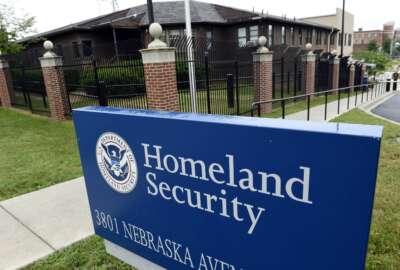Hubbard Radio Washington DC, LLC. All rights reserved. This website is not intended for users located within the European Economic Area.
Inside the Reporter’s Notebook: DATA Act substitute minus accountability provisions; OFPP testing prices paid portal
News and buzz in the acquisition and IT communities that you may have missed this week.
“Inside the Reporter’s Notebook,” is a bi-weekly dispatch of news and information you may have missed or that slipped through the cracks at conferences, hearings and the like.
This is not a column nor commentary — it’s news tidbits, strongly sourced buzz and other items of interest that have happened or are happening in the federal IT and acquisition communities.
As always, I encourage you to submit ideas, suggestions, and, of course, news to me at jpmiller@federalnewsradio.com .
A new version of the DATA Act would be starkly different than the House’s version, especially in the area of accountability.
The Senate Homeland Security and Governmental Affairs Committee is expected to debate a new version of the bill Wednesday.
The amendment in the nature of a substitute would remove the accountability platform called for in previous versions. This is the biggest problem with the new version, said Hudson Hollister, executive director of the Data Transparency Coalition.
“Without the accountability platform, there will be no mechanism for inspectors general to use the newly-standardized federal spending data, combined with public and private data sources, to suss out waste and fraud,” he said in email comments shared with Federal News Radio. “If the final version of the bill fails to expand the Recovery Operations Center to cover all federal spending, taxpayers’ interests will be hurt in two ways. First, waste and fraud that could have been illuminated and eliminated will go undetected. Second — and perhaps more important — without any internal government effort to use the newly-standardized spending data for any purpose, there will be no internal pressure to improve the quality of data published on USASpending.gov. We recognize that the accountability platform was removed in order to reduce the bill’s Congressional Budget Office score. We hope that an offset large enough to restore those provisions can be included in the bill at a later stage.”
Hollister, who wrote the original DATA Act in 2011 before starting up the association, said he’s also concerned about the removal of changes to the Federal Financial Accountability and Transparency Act (FFATA). He said the law needs to change to recognize the Treasury Department now oversees USASpending.gov.
Additionally, he said the amendment would make the Office of Management and Budget responsible for the pilot program around recipient reporting, which also is a bad idea.
“We believe that OMB should not be assigned any direct execution under the DATA Act — both because of the conflict inherent between execution and governmentwide management and because of OMB’s track record with USASpending.gov and the subaward reporting requirement,” he said. “OMB makes no effort to enforce the subaward reporting requirement. Judging from the proportion of total contract amounts reported to total subcontract accounts reporting in recent years, most prime recipients simply do not comply. Instead, responsibilities for reporting should be assigned to the Recovery Board, Treasury, or a Recovery Board successor aligned with Treasury.”
Hollister said there are plenty of good things about the amendment, including clarity and conciseness around data standards.
F rom the file of Missed This #1…the Homeland Security Department is exploring how to recompete its contract to run its data centers.
DHS issued a request for information Sept. 30 to determine capabilities to provide enterprise computing services.
“DHS seeks a new IT business paradigm, based on services and consumption pricing models, to replace the traditional data center hosting structure and square foot consumption pricing model, which will ensure an efficient and effective streamlined transition, over time, from the legacy data center hosting approach,” the RFI stated.
“DHS expects responses to this RFI will provide a better understanding of the feasibility and affordability of potential ideas for delivery of services from the enterprise data center channel (EDC).”
DHS currently uses two data center facilities, one of which is contractor owned and operated. CSC runs one of their data centers at NASA Stennis Space Center in Mississippi under a $390 million deal awarded in 2008. HP runs the other facility located in Clarksville, Va., under a $820 million deal awarded in 2007.
The contract for the non-government data center expires in June 2015.
“Through market research over the past months, DHS Enterprise Data Center (ECS) team has learned of several creative solutions for providing EDC services,” the RFI stated. “DHS Office of the Chief Information Officer is seeking additional strategic information on advances in the industry that may be critical to maximizing the utility, flexibility and adaptability while providing innovative cost effective solutions that mitigate risk and meet the EDC requirement.”
Because of the government shutdown, DHS last week extended the due date for responses to Nov. 7, and encouraged responses from both federal and industry providers.
F rom the file of Missed This #2…The General Services Administration is offering more details on its Network Services 2020 strategy, finally.
On its website, GSA details the goals, benefits and timeline through fiscal 2014. GSA says the NS2020 program will cover transport and data center services, satellite services, mobility and wireless, including managed mobility and the Federal Strategic Sourcing Initiative for wireless, advisory services, government shared services and emerging technologies and services.
GSA recently went out to TechAmerica’s NS2020 Task Force last month with a series of questions to inform its approach to the follow-up plan to the Networx telecommunications contract.
The NS2020 portfolio of services includes multiple program areas which include all services and solutions necessary for the government to satisfy its worldwide telecommunications and networking requirements for the 21st century,” stated the document, which was obtained by Federal News Radio. “The NS2020 program areas will utilize both existing and new acquisition vehicles to deliver service.”
Among the questions GSA is asking for input on are:
- In the future, what should the network services programs’ value proposition be? What services would you recommend GSA provide?
- Regarding future systems, we’re considering implementing a government ordering, inventory and billing portal with a standard interface to vendor systems. Is there an existing electronic data interchange format that we should adopt as the starting point?
- What suggestions do you have to make the Fair Opportunity process more efficient? A phased or staggered transition would be advantageous. What steps should be taken to enable and encourage such an approach?
The bigger question is: how can GSA not make the same mistakes as they did with the Networx contract, which hasn’t achieved 100 percent transition six years after initial award?
T he Office of Federal Procurement Policy is beta-testing the prices paid portal.
Lesley Field, deputy administrator of OFPP, said last week the initial tryout is using existing datasets instead of new data from agencies.
She said OFPP didn’t want to make a new data call to agencies so they are just ensuring the portal works like they expect it to.
Field, speaking at the Coalition for Government Procurement’s fall conference, also offered a few additional tidbits agencies and contractors should be on the lookout for. OFPP will issue new training guidance for project and program managers in the coming week or so.
She said it’s part of a broader effort by OFPP to refresh acquisition education requirements. OFPP also will update training requirements for contracting officers so they align more with what the Defense Department demands.
OFPP issued a memo in September consolidating acquisition training oversight to the Federal Acquisition Institute Training Application System (FAITAS).
M ore from the Coalition conference…Emily Murphy, the deputy chief counsel for the House Small Business Committee, said the committee is growing more concerned about strategic sourcing and its impact on small firms.
She said the General Services Administration should provide small businesses with data about the schedules, such as types of task orders agencies are awarding and for how much. Murphy said this data would help companies decide if it makes sense for them to get a schedule contract.
But GSA can’t provide this kind of data considering one of its major systems dates back to the 1990s and runs COBOL.
Murphy said as GSA and OFPP move forward with the Office Supplies 3 blanket purchase agreement under the Federal Strategic Sourcing Initiative, they should consider several questions:
- If OS3 becomes mandatory, what happens to the other 400-plus contractors currently on the schedule?
- What happens to the industrial base when GSA recompetes the BPA in a few years if the Schedule 75 is closed?
- Can GSA meet or exceed the estimated savings targets over the long term if competition is limited?
There already are growing concerns about the impact on small firms of OS2.
Sam Bornstein, a professor of accounting and taxation at Keane University in New Jersey, surveyed Schedule 75 firms and found based upon GSA sales data, since the inception of FSSI for GSA Schedule 75 Office Supplies in June 2010, the FSSI BPA “non-winners” lost more than 50 percent of their sales to the 15 awarded the FSSI BPAs winners.
“This does not bode well for all small business federal contractors and vendors as GSA aggressively moves forward with plans to implement the FSSI in 10 new categories with the next 2 years,” he said in an email. “I have been pushing the need for a cost-benefit analysis of the FSSI program, and the Schedule 75 impact is a good place to start.”
Bornstein said the long term costs of strategic sourcing outweigh the short term benefits because of what it does to companies and the economy at large.
Murphy also questioned why GSA and OFPP didn’t do a contract consolidation justification as required by law. She called the lack of justification by GSA “problematic.”
Roger Waldron, CGP’s president, said the strategic sourcing effort is driven by OFPP only drive down prices. He said the recent BPAs for janitorial and sanitation services and maintenance, repair and operations (MRO) is an example of GSA both making the market, but also being the holder of the requirements instead of the agency customer knowing what they want to buy.
Waldron said the two BPAs also are overly complex for vendors.
“The closer the contract action to the requirements the better results you will get,” he said. “GSA is forgetting that important lesson.”
O ut&About
The Senate Homeland Security and Governmental Affairs Committee will mark up the DATA Act and the Data Center Consolidation Act on Wednesday. Also on Wednesday, the Association of Government Accountants will hold a conversation about the results of their CFO survey with Norman Dong, acting controller at OMB, Dick Gregg, Treasury’s fiscal assistant secretary and outgoing DHS CFO Peggy Sherry.
AFCEA’s Bethesda, Md.’s chapter is holding its monthly breakfast on Thursday on identity management. Speakers include Donna Roy, the executive director of the Information Sharing Environment Office and program director for the Homeland Security Information Network and National Information Exchange Model at DHS and Sharon James, the director of cybersecurity architecture and implementation at the IRS.
RELATED STORIES:
Copyright © 2024 Federal News Network. All rights reserved. This website is not intended for users located within the European Economic Area.
Jason Miller
Jason Miller is executive editor of Federal News Network and directs news coverage on the people, policy and programs of the federal government.
Follow @jmillerWFED
CX Exchange 2024: HCLSoftware’s Michael Roe on keeping people at center of experience design
Related Topics





